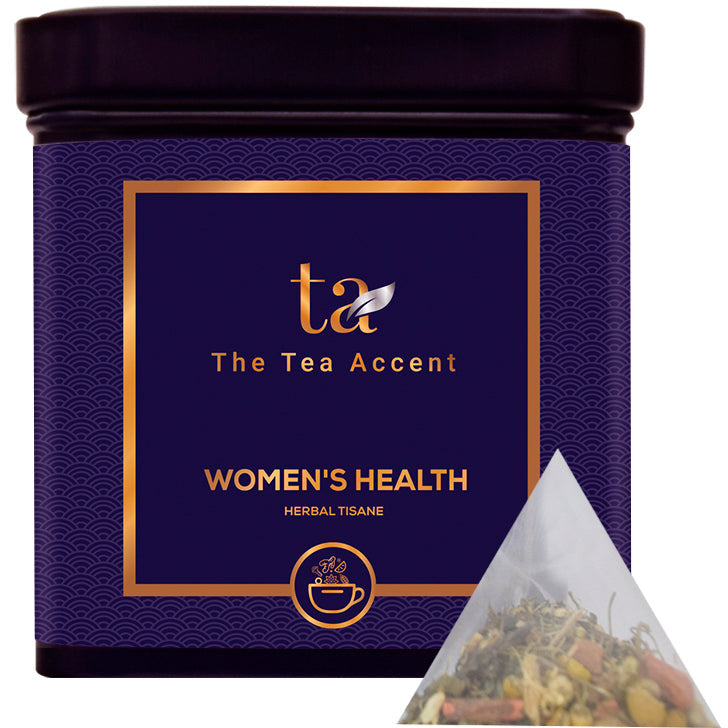The Tea Accent Women's Health Herbal Tisane
The Tea Accent Women's Health Herbal Tisane
Share
This herbal tisane is a fortified green blend, especially to help women suffering from hormonal issues, PCOS and PCOD. 100% caffeine free herbal tisane is loaded with goodness of lavender and chamomile; which help attain hormonal balance and regular periods. This tisane also improves health, control weight and achieve better mental wellbeing.
Ingredients
Chamomile, Nettle, Moringa, Amla (Indian Gooseberry), Cinnamon, Ginger, Shatavari, Fennel, Peppermint, Celery, Shankhpushpi, Punarnava, Manjishtha, Cardamom, Fenugreek, Turmeric, Cumin
Brewing Instructions
Always use fresh water. Bring water to near boiling point (99 degree Celsius). Take 1 teaspoon / 1 teabag in a cup. Pour the heated water and steep the tea for 3-4 mins. Adjust the time of brewing as per desired strength.
Tea flavour enhances as it cools. Our teas can be re-brewed, just steep it longer for the second time.
Know more about the herbs in this 100% caffeine free herbal tisane
Chamomile Chamomile tea has long been used, as a traditional folk remedy, for a wide range of health issues.It has a light, sweet, and slightly apple-like flavor, and it is known for its calming and relaxing effects. Chamomile tea is often consumed as a natural remedy for insomnia, anxiety, and stress. It may also have some mild pain-relieving and anti-inflammatory effects.
Amla (Indian Gooseberry) Amla berries are rich in antioxidants, which reduce the risk of chronic health conditions like heart disease, diabetes, and cancer. Amla berries are also an excellent source of: Vitamin C. Vitamin E.
Nettle Nettle is a herb that is known for its medicinal properties. It is mostly consumed in its tea form to improve several health aspects like heart issues, gut health, immunity development, kidney function enhancement, allergy reduction, UTI treatment and arthritis pain. It is a powerful blood purifier that drives out toxins from the body, making it the perfect addition to your daily routine to stay healthy.
Cinnamon Aromatic and refreshing, cinnamon is a popular blend for teas. The woody spice is believed to have numerous health benefits, besides adding a delighting warming taste to tea. Research reveals that cinnamon helps reduce insulin resistance, gives relief from common cold, indigestion, diarrhoea, poor blood circulation, and menstrual cramps and also helps in weight management.
Turmeric This bright yellow spice is an important additive in many Indian dishes. Used in India since centuries as a spice and medicinal herb, turmeric is known for its anti-inflammatory properties. Studies have shown that the herb contains the compound curcumin, which may restore cardiac health post bypass surgery. It is also used as a dietary supplement for treating arthritis as well as problems related to skin, stomach, liver and gall bladder.
Ginger An essential ingredient in Indian cooking, ginger has been subject of extensive research, which vouches for its contribution to health and healing. It contains compounds and metabolites, which have long been recognized as a time-tested antidote for reducing nausea, pain and inflammation, and improves digestion and metabolism. When taken in tea, it brings relief in common cold and cough because of its warm properties.
Moringa In addition to calcium, iron and potassium, moringa leaves contain several important vitamins: Vitamin A which helps maintain healthy vision, immunity, and fetal growth. Vitamin C which protects the body from pollutants and toxins. Vitamin E which acts as an antioxidant.
Fennel Fennel has been extensively used for its inherent medicinal and culinary properties since ancient times. Fennel seeds are a storehouse of essential vitamins, nutrients and minerals like vitamin C, vitamin A, fibre, potassium, manganese, zinc, iron, and calcium. They contain polyphenols such as rosmarinic acid, chlorogenic acid, quercetin and apigenin. In addition, fennel seeds are characterised by powerful antioxidant, anti-inflammatory and antibacterial properties that enable them to treat various health conditions.
Peppermint Refreshing and zingy, a dash of mint in tea makes the mood delightful with every sip. Fresh mint leaves are a special concoction in iced teas, relished during summer months. It has powerful antioxidant properties and is believed to manage blood sugar levels and treat skin-related problems. It is also found to aid in digestion and breathing disorders.
Fenugreek Fenugreek is a plant that is native to the Mediterranean region. Fenugreek has been traditionally used to help with digestion and to reduce bloating and gas. Some research suggests that fenugreek may help to lower cholesterol levels in the blood. Fenugreek has been shown to have blood sugar-lowering effects and may be helpful for people with diabetes.
Cardamom Cardamom is a spice with an intense, slightly sweet flavor that some people compare to mint. The seeds, oils and extracts of cardamom are thought to have impressive medicinal properties and have been used in traditional medicine for centuries. Cardamom has been traditionally used to help with digestion and to reduce bloating and gas. Some studies have found that cardamom may help to lower blood pressure in people with hypertension. Cardamom has been shown to have antibacterial properties and may be effective at killing certain types of bacteria. ome studies have found that cardamom may help to lower blood pressure in people with hypertension.
Shatavari, also known as Asparagus racemosus, is a herb that is commonly used in Ayurvedic medicine. It is believed to have a variety of health benefits, including promoting fertility and lactation in women, reducing anxiety and stress, and improving digestion. It is also sometimes used as a natural remedy for menopause symptoms. It is also commonly used in Ayurvedic medicine as a rejuvenating tonic for women.
Manjistha, also known as Indian madder or Rubia cordifolia, is a perennial climbing plant that is native to India and other parts of Asia. The plant is known for its medicinal properties and is commonly used in Ayurvedic and traditional Indian medicine. It is used to treat skin diseases, lymphatic congestion, and as an anti-inflammatory agent. The root is also used to purify the blood and improve the complexion. It is commonly used in Ayurvedic medicine to treat conditions such as skin disorders, urinary tract infections, and rheumatoid arthritis.
Shankhpushpi (Convolvulus pluricaulis) is a perennial herb found in India and other parts of Asia. It is commonly used in Ayurvedic medicine for its cognitive-enhancing and memory-boosting properties. It is also used for treating anxiety, insomnia, and other neurological disorders. The plant's leaves, flowers, and roots are all used in various forms of traditional medicine.
Punarnava (Boerhavia diffusa) is a perennial herb found in India and other parts of Asia. It is commonly used in Ayurvedic medicine for its diuretic and anti-inflammatory properties. It is also used for treating various ailments such as diabetes, hypertension, and liver disorders.
Disclaimer
Disclaimer
Always read the label and follow the directions for use. Use only as directed.
Images may differ in appearance from the actual product.
All orders are subject to availability. Whilst we endeavour to keep our stock levels accurate, some products may not be immediately available. If an item is purchased that is not available in a reasonable time frame, we will contact you to inform you of excess delays or to discuss alternative product options.
SKU:
SKU:917983
Barcode:
Translation missing: en.products.product.barcode:0744109421013










